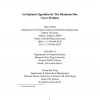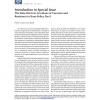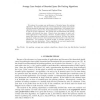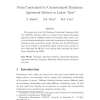ALGORITHMICA
2008
15 years 2 months ago
2008
ALGORITHMICA
2008
15 years 2 months ago
2008
ALGORITHMICA
2008
15 years 2 months ago
2008
ALGORITHMICA
2008
15 years 2 months ago
2008
116
click to vote
ALGORITHMICA
2008
15 years 2 months ago
2008
We consider the problem of approximately integrating a Lipschitz function f (with a known Lipschitz constant) over an interval. The goal is to achieve an error of at most using as...
ALGORITHMICA
2008
15 years 2 months ago
2008
ALGORITHMICA
2008
15 years 2 months ago
2008
Let T be a spanning tree of a graph G and S V (G) be a set of sources. The routing cost of T is the total distance from all sources to all vertices. For an edge e of T, the swap ...
133
click to vote
ALGORITHMICA
2008
15 years 2 months ago
2008
We show efficient algorithms for edge-coloring planar graphs. Our main result is a linear-time algorithm for coloring planar graphs with maximum degree with max{, 9} colors. Thus...
103
click to vote
ALGORITHMICA
2008
15 years 2 months ago
2008
We propose and study the Maximum Constrained Agreement Subtree (MCAST) problem, which is a variant of the classical Maximum Agreement Subtree (MAST) problem. Our problem allows us...




